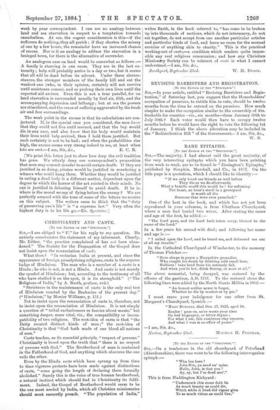CHRISTIANITY AND CASTE.
[TO THE EDITOR OF THE " SPECTATOR."]
SIR,—T am obliged to "F." for his reply to my question. He entirely corroborates the statement of my informant. Clearly, Mr. Editor, "the practice complained of has not been aban- doned." The Society for the Propagation of the Gospel does not insist upon the renunciation of caste.
What then ? "In sectarian India at present, and since the appearance of foreign proselytising religions, caste is the express badge of Hinduism. The man who is a member of a caste is a Hindu ; he who is not, is not a Hindu. And caste is not merely the symbol of Hinduism ; but, according to the testimony of all who have studied it on the spot, it is its stronghold." (" The Religions of India," by A. Barth, preface, xvii.) "Strictness in the maintenance of caste is the only real test of Hinduism exacted by the Brahmins of the present day." (" Hinduism," by Monier Williams, p. 151.) Not to insist upon the renunciation of caste is, therefore, not to insist upon the renunciation of Hinduism. It is not simply a question of "tribal exclusiveness or fancies about meats," but something deeper, more vital, viz., the compatibility or incom- patibility of two religions. The root-idea of caste is that "the Deity created distinct kinds of men ;" the root-idea of Christianity is that "God bath made of one blood all natioris of men."
Caste teaches, as its essential principle, "respect of persons." Christianity is based upon the truth that " there is no respect of persons with God." The Brotherhood of man is contained in the Fatherhood of God, and anything which obscures the one veils the other.
Even by the Hindu sects which have sprung up from time to time vigorous protests have been made against distinctions of caste, "some going the length of declaring them formally abolished." Surely this is the voice of true human brotherhood, a natural instinct which should find in Christianity its fulfil- ment. Indeed, the Gospel of Brotherhood would seem to be the one most needed by India, which all Christian missionaries should most earnestly preach. "The population of India,"
writes Barth, in the book referred to, "has come to be broken up into thousands of sections, which do not intermarry, do not eat together, do not accept from one another particular articles and particular kinds of food, and leave no room for the mutual exercise of anything akin to charity." This is the practical working-out of caste,—a condition which renders quite impos- sible any real religious communion ; and how any Christian Missionary Society can be tolerant of caste is what I canna's understand.—I am, Sir, &c.,
































 Previous page
Previous page